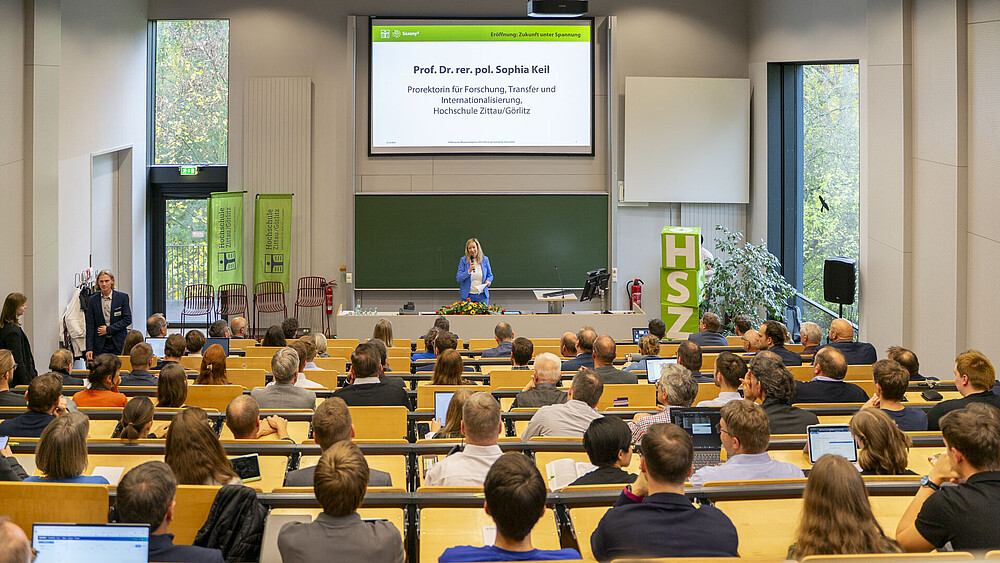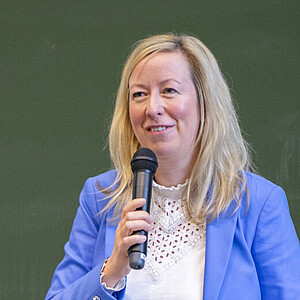The HSZG invited guests to the "Opening of the Science Year 2025/26" in Görlitz on October 22.

What will the world of tomorrow look like? Utopia or dystopia? Preservation or transformation? Transformation as a word is often used, but its genuine meaning often remains blurred. Transformation means a fundamental change or a fundamental change in structures, processes or characteristics. Nothing is as it was - and the "future is under tension". "We are at a turning point - regionally and globally," says Prof. Dr Sophia Keil, Vice President of Research, Transfer and International Affairs at Zittau/Görlitz University of Applied Sciences, in her welcoming address at the "Opening of the Science Year 2025/26" event at Zittau/Görlitz University of Applied Sciences. The HSZG hosted the event in Görlitz on October 22 under the motto: "Future under tension: energy, AI and us in the city of tomorrow" . The focus was on questions relating to the sustainable energy transition and shaping the future with the increasing use of artificial intelligence (AI). What opportunities exist in the combination of AI and energy technology to successfully shape diverse transformations?
Programmatically, the event referred to the theme of the "Federal Year of Science 2025 - Future Energy" and expanded this to include the topics of artificial intelligence (AI) and urban and regional development. In a keynote speech, keynote speeches and a panel discussion, the participants discussed how current and future research in the fields of energy, artificial intelligence and urban and regional development can help to successfully support and shape complex transformations in climate, energy, economy and society. This was done both globally and regionally with a focus on the development of Lausitz.

We are at a turning point - both globally and regionally. Energy and artificial intelligence are more than just technological buzzwords: they represent a profound transformation of work, knowledge, lifestyles and social cohesion. 'Future under tension' - the motto of our Year of Science - aptly describes this state of affairs: between challenge and hope, between risk and opportunity, between preservation and new beginnings, between utopia and dystopia. The speakers at the opening of the Year of Science impressively demonstrated how interdisciplinary thinking, creativity and the power of research enable innovation. For us at Zittau/Görlitz University of Applied Sciences, this means that we combine technological opportunities with regional responsibility and shape the future - here in Lausitz and far beyond.
”The debate and discussion about the use of AI is omnipresent in the media and society, the (inter)national zeitgeist in relation to artificial intelligence is critical and optimistic with the following questions arising time and again: How will we generate knowledge in the future if AI technology is always at our side? If AI and human users merge more and more, how do we learn and know how to think and act in an ethically responsible manner, not just in a purely machine-optimized way?
"AI has developed immense momentum in recent years," says Prof. Dr. Dr. Tanja Kneiske in her keynote speech "Future under tension: Can AI help bring energy transition and society together?". Kneiske was appointed to the Expert Council for Climate Issues by the German government in 2025 and is one of the "100 Heads of Science in the Capital". Since 2024, she has headed the "Technology and Management of Integrated Energy Infrastructures" department at TU Berlin and is also Scientific Director at the Fraunhofer IEG in Cottbus. In her presentation, Kneiske quotes Sam Altman, co-founder and CEO of OpenAI (ChatGPT), on the fascination of artificial intelligence: "What is so special about AI? - We can do 10 years of science in one," said Sam Altman at a science conference in Berlin 2025.
The consequences of this for users: "Things that used to take days and hours can now be done in seconds," says Kneiske. AI can also come into play in the realization of the energy transition: "We have to be clear: In the energy transition, we are not only looking at electricity grids, but also the planning, expansion and linking of gas, heat and hydrogen grids. Current planning models are reaching their limits due to increasing complexity. In order to optimally model and plan urban energy supply systems, suitable tools and methods are required - including those from AI and machine learning," says Kneiske. Kneiske and her team have developed the "DAVE" software tool. It collects, processes and merges data from a wide variety of sources in order to develop an energy grid model with the help of AI. This enables cities, municipalities and utilities to access the collected data and models of their region online, optimize the planning process and make data-based decisions. A model for Lausitz too?
The topics of energy, energy transition and structural change are of fundamental importance for Lausitz. For a long time, the extraction of fossil fuels in the form of open-cast lignite mining shaped both the internal and external perception of the region. "Energy as a joint task" and "DC voltage under control - switching technology for the networks of tomorrow" were the titles of the keynote speeches given by young scientists Tom Richter, Jonas Pfeiffer and Emilia Herzig following the introductory keynote. The opening of the Year of Science also marked the start of the HSCG program for young scientists: "Young Scientists@HSZG". In their presentations, Richter, Pfeiffer and Herzig outlined scenarios and challenges of increasing energy requirements and possible solutions, such as the establishment of a DC campus in Lausitz. Direct Current (DC) versus or in harmony with Alternating Current (AC). "In addition to technological openness, we also need technological determination. China is in some cases much faster in developing alternative energy models," says Tom Richter.
"Who gets what, when, and how?" - This immanent question of international political economy also applies to Lausitz and "...us in the city of tomorrow".
"We are preserving the status quo. People in the region don't know exactly what the research in Zittau and Görlitz is doing at all," Thomas Krusekopf from the GreenZitty Zittau initiative notes critically in the panel discussion "...and us in the city of tomorrow" - with the other participants Prof. Dr. Robert Knippschild (Interdisciplinary Centre for Transformative Urban Redevelopment Görlitz), Carolin Fischer (Dresden University of Applied Sciences, research associate at NFG MUBARES) and Diana Karbe (Project Manager for Economic Development in the City of Hoyerswerda). "We have to equip the region with modernity so that young people become curious," says Krusekopf. Diana Karbe shows the facts of the population decline in Hoyerswerda. As early as 2009, the Bertelsmann Foundation outlined a 33.4 percent decline in Hoyerswerda's population between 2006 and 2025. "There may not be any people left in Hoyerswerda to do the necessary work at all," Karbe reported in the panel discussion.
Karbe may have been speaking realistically, utopian or dystopian. And not just in relation to Lausitz, but also to structurally weak regions in Bavaria, Saxony-Anhalt, North Rhine-Westphalia, northern England or the Rust Belt in the USA, among others.
How does change or transformation succeed? Alexander Kratzsch, Rector of Zittau/Görlitz University of Applied Sciences, calls for courage in his welcoming address at the "Road to Innovation" event organized by "futureSAX" on 22 October in the morning, while Tanja Kneiske, Jonas Pfeiffer and Thomas Krusekopf cite curiosity, togetherness and openness (to the world) as necessary characteristics. "A successful transformation requires reliable, trusting and continuous partnerships between business, science, politics and civil society," concludes Prof. Dr. Robert Knippschild.
"The event was inspiring and deserved more than 1,000 participants," said one visitor to the degree of the event. Embedded in the opening of the Science Year 2025/26 was the awarding of the Zittau/Görlitz University of Applied Sciences Sponsorship Prize to Lea Karras, Johannes Krutz, Franz Erik Wenger, Anna Grohmann and Alina Hanisch and the Al-Makhawi Prize to Josefine Wiethe for outstanding academic achievements.
"futureSAX", the innovation platform of the Free State of Saxony, had organized the kick-off conference "Road to Innovation" at Zittau/Görlitz University of Applied Sciences at the invitation of Professor Keil - for the first time at the Görlitz location. The subsequent "Opening of the Science Year 2025/26" was moderated by Susanne Stump, Managing Director of "futureSAX".
In addition to the program, the HSZG hosted an accompanying exhibition and poster show. This included exhibits from ongoing research projects from all HSZG research institutes (IPM, TRAWOS, ZIRKON, GAT) as well as the Faculties of Natural and Environmental Sciences, Electrical Engineering and Computer Science and Faculties of Business Administration and Engineering Management. There was also a poster exhibition in the auditorium with projects that have been and are being funded by the Saxon state parliament. This made the wide range of research at the HSZG visible, as well as outstanding major projects.
Text: Frank Leberecht
Photos: Sven Müller , André Seeliger and futureSAX
The futureSAX event series On the Road to Innovation provided insights into European-funded cutting-edge research from Saxony with speeches by the following people, among others:
Keynote Speech: "Future under tension: Can AI help bring energy transition and society together?"
YoungScientists@HSZG: AC/DC between research & practice
Keynote speeches:
Panel discussion "...and we in the city of tomorrow"
Participants:
Moderation of the event "Opening of the Science Year 2025/26"
On behalf of the HSZG, I would like to thank everyone involved - all speakers, participants and visitors - at the opening event of the Science Year 2025/26 "Future under tension: Energy, AI and us in the city of tomorrow".